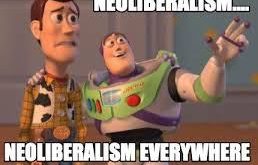One of the most beautiful results of probability theory is Markov’s inequality (after the Russian mathematician Andrei Markov (1856-1922)): If X is a non-negative stochastic variable (X ≥ 0) with a finite expectation value E(X), then for every a > 0 P{X ≥ a} ≤ E(X)/a If the production of cars in a factory during a week is assumed to be a stochastic variable with an expectation value (mean) of 50 units, we can – based on nothing else but the inequality – conclude that the...
Read More »Snart kommer änglarna att landa
Snart kommer änglarna att landa [embedded content]
Read More »O Holy Night
[embedded content] This live performance remains unequalled to this day. Jussi Björling — the greatest of them all.
Read More »Neoliberalism
[embedded content]
Read More »RBC models — willfully silly obscurantism
RBC models — willfully silly obscurantism As a result of the three waves of new classical economics, the field of macroeconomics became increasingly rigorous and increasingly tied to the tools of microeconomics. The real business cycle models were specific, dynamic examples of Arrow–Debreu general equilibrium theory. Indeed, this was one of their main selling points. Over time, proponents of this work have backed away from the assumption that the business...
Read More »May It Be
[embedded content]
Read More »The sickening market-driven society
The sickening market-driven society The market was meant to emancipate us, offering autonomy and freedom. Instead it has delivered atomisation and loneliness. The workplace has been overwhelmed by a mad, Kafkaesque infrastructure of assessments, monitoring, measuring, surveillance and audits, centrally directed and rigidly planned, whose purpose is to reward the winners and punish the losers. It destroys autonomy, enterprise, innovation and loyalty, and...
Read More »Nobelpriset i ekonomi är nykolonialt!
Nobelpriset i ekonomi är nykolonialt! I år har priset tilldelats tre forskare verksamma vid universitet i USA, Esther Duflo, Abhijit Banerjee och Michael Kremer som har fått priset för sin forskningsmetod som kallas ”randomiserade kontrollförsök” … Men i det internationella vetenskapssamhället har det lagts fram en hel del kritik mot denna metod och årets pristagare. Exempelvis har man pekat på de etiska aspekterna när man experimenterar med människor,...
Read More »Peace on earth
[embedded content] Still, after more than 40 years, the greatest Christmas duet ever recorded.
Read More »Oíche Chiúin
[embedded content]
Read More » Lars P. Syll
Lars P. Syll




